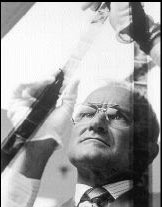ONE HOUR PHOTO
written and directed by Mark Romanek
with Robin Williams
opens Aug. 30 at Guild 45
Enough, Robin—we get the idea. After playing a murderous, foul-mouthed children’s TV host in Death to Smoochy and an insinuating Alaskan killer in Insomnia, your rogues’ gallery is now complete with One Hour Photo. (Actually, I would include Patch Adams among such villainous roles, but that’s just a quibble.) Resolutely working against type, Williams’ latest malefactor is a mild-mannered photo processor so bland that his thinning blond hair and Velcro-closure shoes make him disappear into the fixtures of the SavMart mall. Sy Parrish has all the personality of a bar-code scanner, and the patrons whose photos he handles so carefully—too carefully, it emerges—treat him with equally little regard. That’s a mistake, of course, since Sy’s meekness belies pathology, and his particular solicitousness to the Yorkin family masks a dangerous obsession in this atmospheric but fundamentally second-rate suburban thriller.
“I process these photos as if they were my own,” says Sy, who secretly wishes they were. He fantasizes that he’s a member of the picture-perfect Yorkin clan, and needily tries to ingratiate himself with Nina (Gladiator‘s Connie Nielsen) and her cute 9-year-old son. Is he a pervert or a child molester? Photo isn’t willing to go places that the similar L.I.E. did; this lonely, middle-aged monster wants to transgress boundaries, but they’re emotional, not sexual.
Yet MTV-trained Mark Romanek’s debut feature too glibly conveys the eerie stillness of posh suburban homes and sterile discount malls. He doesn’t sufficiently grasp or trust the dramatic tension between the two—the class barrier dividing pampered shoppers and service- industry drones. Instead, Romanek simply makes Sy a victim of his own past dysfunctional family history, then finally provides a pat psychological explanation for his behavior with a hackneyed police- interrogation scene framing device.
Thus Sy becomes a basically sympathetic figure—a stalker twisted and distorted by his own repression. He’s the opposite of the motor-mouthed DJ in Good Morning, Vietnam, and there’s pathos in seeing Williams at a loss for words for once. All that famously sweaty stage energy turns inward into a memorably naturalistic performance. It’s the hallmark of a mature actor that Williams doesn’t need to tear the scenery down to show us he’s a bad guy.









